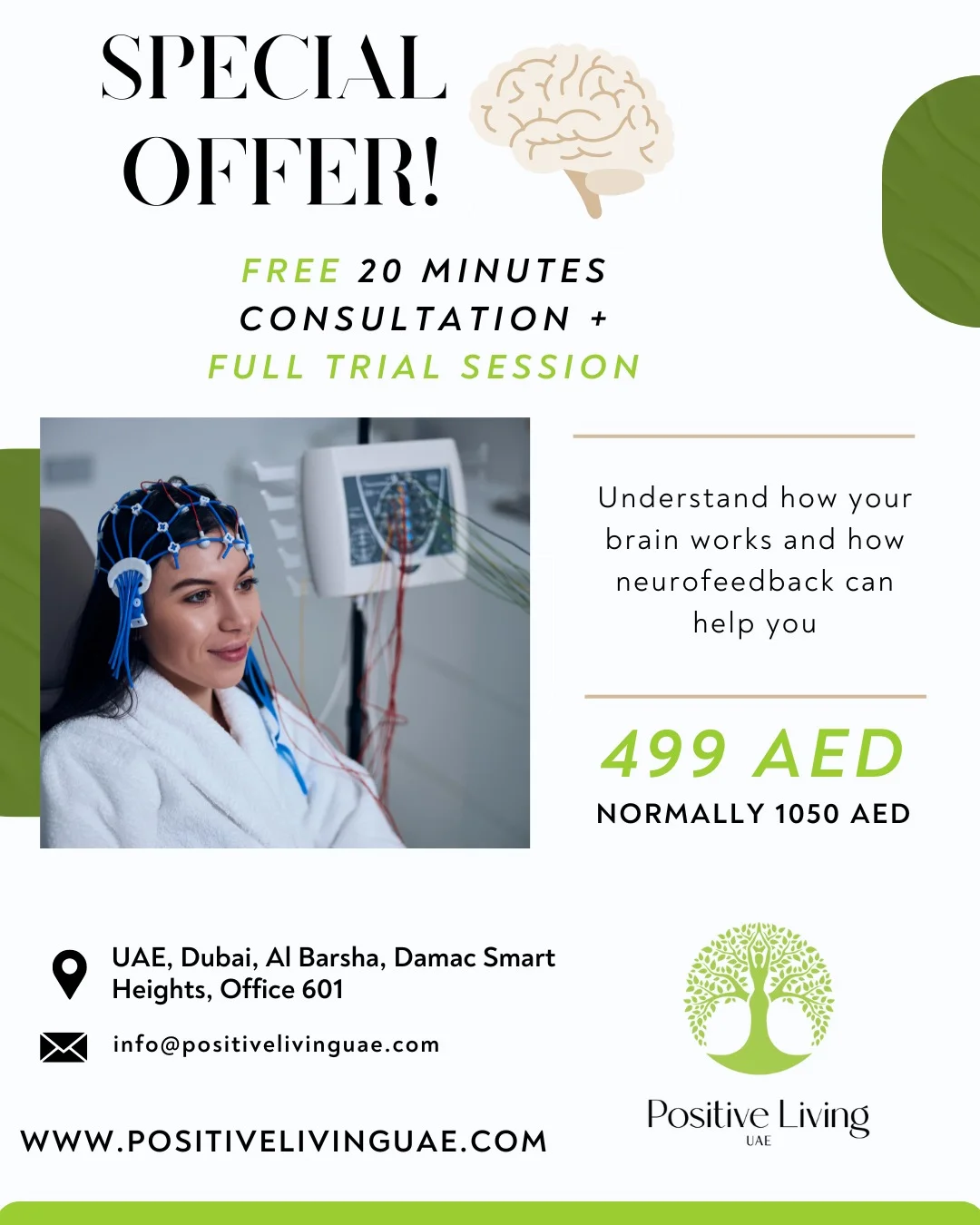Neurofeedback Therapy for Insomnia: How to Train Your Brain for Better Sleep
In today’s world, with work and everything else involved in our daily lives, getting a good night’s sleep can feel like a luxury. If you are tossing and turning, you are not alone, and you might be struggling with insomnia, something that has been affecting millions, disrupting their daily life and health.
But what if you could train your brain to unwind naturally? Neurofeedback therapy for insomnia is a gentle, drug-free approach that’s gaining popularity among those looking to improve their sleep. In this article, we’ll explore how neurofeedback works for sleep, the potential benefits it offers, and where to find neurofeedback options in Dubai.
The Toll of Insomnia on Your Well-Being
Insomnia goes beyond just feeling tired; one could say it is a persistent struggle with falling asleep, staying asleep, or waking too early. This result is often associated with daytime fog, low energy, and mood dips. Chronic cases can increase the risk of anxiety, depression, and even heart problems, as the body misses out on essential repair and recovery. While many people turn to sleep medications, these often bring side effects and the risk of dependency. Whereas, natural alternatives such as neurofeedback therapy for insomnia, offer a promising path to better sleep, without any grogginess.
If this resonates with you, know that you are not alone. Sleep struggles are challenging, but exploring approaches like neurofeedback for sleep may be an important step toward lasting relief.
Neurofeedback: The Basics
Neurofeedback therapy, available in Dubai and worldwide, is essentially brain training using real-time feedback. Sensors are placed on your scalp, and brainwaves are monitored via EEG and displayed on a screen without any invasive procedures. When your brain produces optimal patterns, such as increasing calming alpha waves, you receive rewards, like a clearer video or pleasant sound.
Over time, this process, known as operant conditioning, helps your brain learn to self-regulate, much like learning a new skill. It’s safe for all ages, from children to seniors, and sessions typically last about an hour. Think of it as a way to help your mind find better balance, a particularly valuable tool in high-stress environments like Dubai.
How Neurofeedback Operates
The process begins with a brain map to identify imbalances, such as excess beta waves associated with heightened alertness. During sessions, you simply relax while the system gently guides your brain toward calmer states, for example, enhancing sensorimotor rhythm (SMR) for supporting deeper sleep. The feedback works on a subconscious level, requiring no effort beyond staying present, as your brain makes the adjustments through neuroplasticity. Research suggests that 10–20 sessions may help rewire the patterns that drive hyperarousal, one of the key drivers of insomnia.
Targeting Insomnia with Neurofeedback
For those struggling with their sleep, neurofeedback therapy for insomnia addresses root causes like overactive minds. By training the brain to dial down high-frequency waves and amp up restorative ones, it promotes easier wind-downs.
Research suggests that it may cut sleep onset time and boost total rest, helping you wake up feeling refreshed. Dubai can often be mentally demanding, and neurofeedback centers tailor this to local lifestyles, combining it with holistic care. It’s not magic, but for many, it can be the ally they are searching for to reclaim peaceful nights.
The Science Behind Sleep Enhancement
Neurofeedback helps improve sleep by training specific brainwaves. For instance, enhancing sensorimotor rhythm (SMR 12-15 Hz) supports sleep spindles, which are brief bursts of activity that protect rest from disruptions. Hyperarousal, common in insomnia, shows as elevated beta activity; neurofeedback works to counter this by encouraging alpha waves (8-12 Hz) to promote relaxation.
Sessions teach your brain to prepare when it’s bedtime, potentially increasing deep sleep stages. While mechanisms vary by protocol, the goal is to produce stable rhythms for consistent slumber. In the end, the focus is all about empowering your brain.
Advantages of Neurofeedback for the Brain
Neurofeedback offers a drug-free, non-invasive way to train brain activity, improving cognitive and emotional functions with the help of neuroplasticity. It utilizes real-time EEG feedback to help regulate brainwaves, which can enhance focus, alleviate stress, and support mental health without the need for medications. Evidence has been promising for conditions like ADHD, anxiety, and insomnia. In diverse applications, from peak performance to disorder management, neurofeedback providers such as Positive Living UAE tailor sessions to your individual needs.
Non-Invasive and Drug-Free Nature
Neurofeedback is entirely non-invasive, using scalp sensors to monitor brainwaves without any physical intrusion or discomfort. This avoids risks associated with medications, such as side effects or dependency, making it suitable for long-term use. Clinical reviews report minimal adverse effects, highlighting its safety for various age groups.
Brainwave Regulation for Improved Functioning
It trains shifts from imbalanced waves, like excess beta, to optimal patterns such as alpha for relaxation or SMR for focus. This regulation can improve attention, memory, and processing speed. Evidence points to normalized EEG patterns, creating better neural communication across brain regions.
Potential for Long-Term Neuroplastic Changes
Neuroplasticity helps in long-term change, developing healthier habits that have a positive impact. Follow-ups show gains lasting months, lowering the need for ongoing therapy. Research also highlights the enduring cognitive and emotional benefits, though outcomes differ across individuals.
Reduction in Mental Health Symptoms
Neurofeedback shows promise in easing anxiety, depression, and ADHD by stabilising overactive brain activity. Clients often report steadier moods and reduced impulsiveness, supported by improvements on clinical scales. It also helps to show notable gains in focus and behavior for ADHD, suggesting value as a complement to other therapies.
Better Overall Brain Health and Performance
By building stress resilience, neurofeedback supports clearer thinking, creativity, and peak performance. Athletes and artists see improvement in skills and confidence, while studies link it to recovery benefits and progress in brain-computer interfaces.
Sleep Aids vs Neurofeedback: Finding the Right Solution
When exploring ways to tackle insomnia, neurofeedback emerges as an innovative, drug-free approach alongside traditional options like medications and cognitive behavioral therapy for insomnia (CBT-I). It trains the brain to encourage better sleep patterns, offering a path for those preferring natural methods.
Research highlights its potential to address underlying brain activity, while CBT-I focuses on habits and thoughts, and meds provide quick chemical relief.
Mechanisms at Work
Neurofeedback uses real-time EEG feedback to encourage calming brainwaves, like boosting alpha or SMR rhythms, which may ease the overactive mind common in insomnia. This promotes self-regulation without external aids.
Safety and Potential Drawbacks
One of neurofeedback’s appeals is its safety profile, with rare, mild effects like brief fatigue and no risk of dependency. It’s non-invasive, making it suitable for many. CBT-I is equally safe, focusing on talk-based changes without physical risks. Medications, while effective in the short term, can lead to tolerance, rebound insomnia, or side effects like grogginess.
Long-Term Outlook
Neurofeedback supports enduring changes by improving the brain’s natural regulation, with benefits persisting months after sessions. This aligns well with CBT-I’s lasting tools for self-management, often praised for sustained remission. Medications are typically better for temporary use, as prolonged reliance might complicate sleep further.
Neurofeedback Options in Dubai for Better Sleep
Dubai’s prioritization of wellness makes neurofeedback Dubai increasingly accessible for those looking to improve sleep. With a mix of international expats and locals facing high-stress lifestyles, clinics offer advanced neurofeedback therapy Dubai tailored to issues like insomnia.
Many use advanced, FDA-cleared technology for brain mapping and personalized sessions, helping regulate brainwaves naturally without medication. If you are struggling with restless nights, exploring neurofeedback for sleep could be an effective solution.
Factors to Consider While Selecting a Neurofeedback Service Provider
Choosing a provider for neurofeedback therapy for insomnia involves more than convenience, as you also have to consider aspects like safety, efficacy, and alignment with your goals. Prioritize board certifications like BCIA, which mandates extensive training to confirm ethical and skilled practice.
Experience always counts; therefore, seek therapists with 5+ years in neurofeedback, ideally licensed in psychology or neurology. Equipment should be FDA-cleared, with protocols like qEEG for personalized assessments. As reviews can provide better insights, make sure you factor that in too. Consider integration with therapies like hypnosis, flexible scheduling, and DHA compliance for UAE standards.
Why Positive Living Stands Out
Positive Living UAE pairs rigorous neurofeedback with a genuinely compassionate approach to help people sleep better. Our certified team uses personalised neurofeedback alongside hypnosis and coaching to retrain unhelpful brain patterns and ease the emotional triggers that fuel insomnia. As an award-winning center, we focus on measurable improvements and a compassionate, individual pathway rather than one-size-fits-all fixes.
Ready to try a different approach to sleep? Request an assessment with Positive Living and discover how personalised neurofeedback can help you sleep better, and in turn have a better life.


